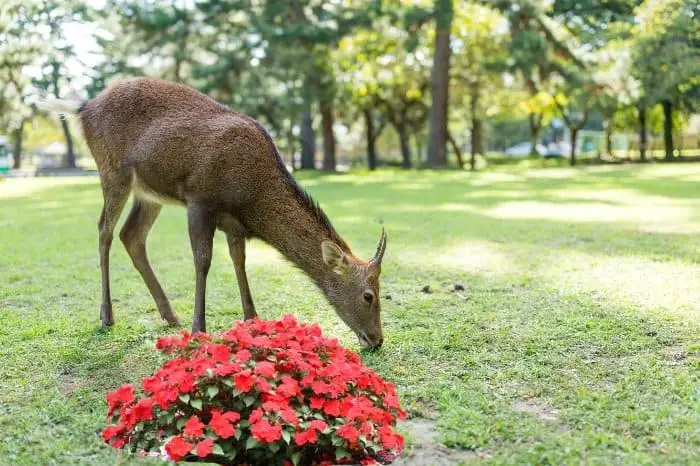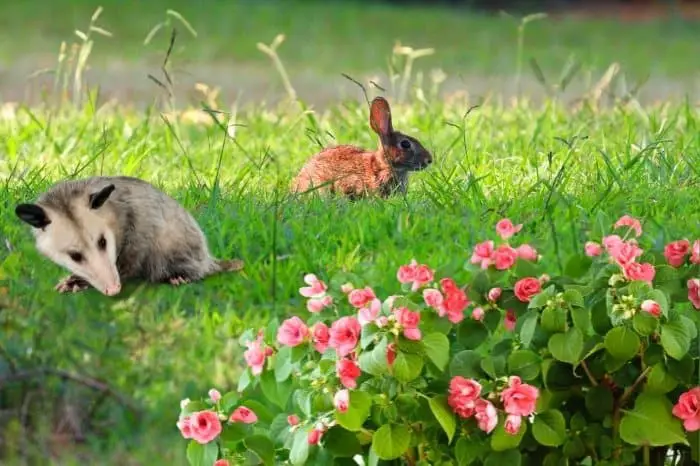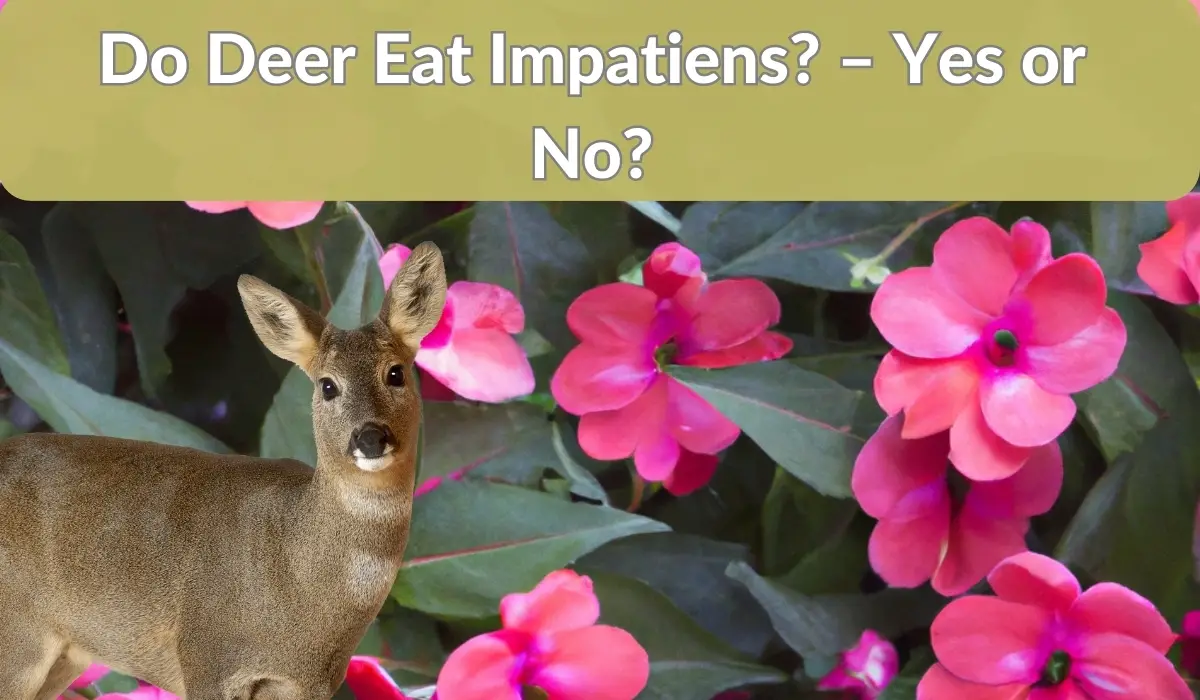Last Updated on June 20, 2023 by Tony Manhart
Do deer eat impatiens is a question we commonly get from most gardeners, and we are here to demystify this topic and clear things up for you.
Gardening is an enjoyable and rewarding pastime! However, it does not come without its challenges – good days, bad days.
Gardening knowledge and tips are the keys to ensuring that you can successfully garden without many challenges.
If you are thinking of growing impatiens or have already planted yours, one of the things you might want to know the most is if they are susceptible to deer and how to protect them.
Do Deer Like Impatiens?
Yes, deer eat impatiens! Impatiens are not deer resistant!
These destructive creatures will eat these plants if you leave them unprotected. If your area has many deer, it is critical to take the necessary steps to protect your impatiens.
Deer, in most cases, seem harmless, but if you leave them alone in the garden, they will wreak havoc on your crops.
Deer often target the lovely impatiens (Impatiens spp.), and they are known to cause severe damage to these beautiful flowering annuals.

If you want to stop these animals from eating impatiens, grow them in the USDA plant hardiness zones 9 to 11 or use chemical and nonchemical methods to eliminate the deer.
To protect your impatiens, plant them in a visible spot or near the house to keep an eye on them. Impatiens look amazing on the window boxes, and having them here will increase the chances of catching the deer before it eats your flowers.
You can also plant flowers that do not attract deer near the impatiens, like the herb mint or the annual floss flower. Deer relies heavily on its sign of smell to guide it to its meal, so adding pungent plants will deter them.
Knowing that deer eat impatiens is the first step to guarding your flowers. Keep reading to find out some of the easiest and best ways to protect your plants.
Protecting Your Impatiens From Deer
Deer are skittish, cunning creatures! They are always searching for the quickest meal to gobble down. Your unguarded impatiens will easily attract and invite these creatures to dine on them. Let’s look at some easy ways to keep deer away from your plants.
Plant Them Closer Home
Depending on where your garden is located, if you can plant these beauties near your home it would be ideal to protect them. Deer are easily frightened by any human or pet presence and will run away when you scare them. If you plant impatiens near a window or close to the house, you will keep a close eye making it easier for you or your dog to scare these animals away as they approach your plants.
Surround Your Impatiens With Other Plants That Deer Does Not Like
Plant your impatiens on the back and have other plants that deer do not like at the front. Plants like herb mint or marigold that smell strongly or poppies that are poisonous act as deterrents to deer. They also add vibrant color and variety to the garden.
Invest In Noise-making Objects In Your Garden
You can try making some uncomfortable noise or lights that will scare these stubborn creatures away. Try installing motion-activated lights or wind chimes in your garden. Deer are easily frightened and these lights or loud noises will scare them away. However, they are also very bright and with time may get used to these objects and stop fearing them. Keep changing your tactics so that the deer do not get used to your methods.
Use Natural Or Chemical Repellents
You can choose to make your own or decide to buy one from a store near you. Treating your impatiens with repellants prevents them from being eaten by deer. Ensure that you reapply the repellants regularly to keep them protected always.
Deer Out 32oz Concentrate Deer Repellent
What Other Animals Eat Impatiens?
Unfortunately, deer are not the only creatures that eat your impatiens. There are many other hungry creatures out there waiting to snack on your plants. Knowing what creatures these are will help you protect your impatiens from all of them in good time.
Opossums, rabbits, and insects are all potential threats to your impatiens. Each destructive creature requires a different means of protection. No one method is suitable for all these creatures.
For example, fences will not deter any of these small creatures but will keep deer away. Rabbits can fit through gaps in your fence, opossums are excellent climbers, and insects can easily fly over or climb up your fence.
Netting is a great protective method, but it will only keep the rabbits and opossums away while allowing the insects in.
By combining netting and insect repellent, you give your flowers the best chance for survival. One excellent repellent is Bonide – this insect control for vegetables, fruit, and flower takes care of all types of insects.

We understand planning and preparing a garden is hard work. So we want you to be sure that you have enough knowledge and help protect your plants and give them a great chance of survival. Knowing what creatures eat up your impatiens and learning how to prevent them is critical.
Find out what other flowers deer like to eat:
Take Home
Now you know more about protecting your impatiens from deer and other creatures. The strategies we have discussed above may look simple, but hopefully, they have given you an idea of the types of actions you should use to protect your plants.
If you are thinking about planting growing impatiens, you can grow it among other repellant flowers to protect them and get more blooms.
One truth you need to know is no plant is deer-proof. When landscaping your yard, it is best to mix rarely damaged plants with severely damaged ones so they can be protected naturally.
The success of your gardening will depend on the local deer populations and weather conditions. You can also speak to a local organization dealing with deer if you notice their number growing in your area.
All the best in your gardening journey!
FAQ’s
FAQs
What deer eat impatiens?
Yes, unfortunately for many gardens that feature this flower are known to receive a lot of visits from deer who love to eat them up. For this reason many gardeners choose to put flower that deer dislike around their impatiens.
What are other animals that eat impatiens?
Other animals which feed on impatiens include weevils, slugs, beetles, and birds. All of the following are likely to be observed eating impatiens: Birds: Crows, ravens, and jays are very fond of impatiens.
The good thing is that impatiens are a very hardy plant. They can tolerate drought and even the heat of summer, as well as cold winter temperatures. It will grow in full sun or partial shade.
How can you protect impatience?
You can cover the plants with a fine mesh net to prevent them from getting to it, and then put some mothballs on it. That should keep them away.
I have had good luck with the hanging baskets, especially if you add a layer of mesh over them to keep the spiders out. If the plants are small enough, I put them on a piece of wire, then wrap the wire around the top of the basket. You don't want to leave any gaps between the basket and the wire, or the plants may get sucked up into the wire.
You can use a variety of repellents. The best are either oil or alcohol based. I like to use a citrus-based one, and it's pretty effective. I usually put a few drops on the leaves and flowers of the plants, and it lasts for quite some time.
You can also use a product like Crop Stop, which you can spray on the plants. This product actually repels animals like rabbits and deer from eating your garden. It also works well if you're having a problem with grasshoppers, which are drawn to the color yellow.
Do squirrels eat impatiens?
Squirrels are omnivores and will eat just about anything, including impatiens. They also enjoy eating berries, nuts, seeds, bugs, fruits, flowers and even frogs.
What flowers do deer like to eat?
Deer are not fond of most flowers.
Some of the plants they will eat include the following:
Alstromeria - A type of flowering shrub.
Buckwheat - An herbaceous plant with leaves similar to rhubarb.
Celosia - A type of grass. Chrysanthemum - A type of flower.
Clematis - A type of vine.
Comfrey - A perennial herb, a member of the parsley family.
Dandelion - An annual weed that can be eaten by rabbits.
Dock - An aquatic herb. Fennel - A type of herb.
Fern - An evergreen fern.
Flax - A type of plant. Honeysuckle - A vine.
Lavender - A type of flower.
Marigold - A common garden flower.
Mint - A common garden herb.
Caroline is a gardener who loves to get down to the nitty–gritty of gardening. She proudly proclaims herself as a ‘dirt worshipper‘ and can often be found deep in the garden, covered in soil and singing to her plants. As a self–proclaimed ‘plant whisperer‘, Caroline believes that plants need love and attention just like any other living thing, and she loves to give them both. When she‘s not tending to her garden, you can often find her researching the latest gardening trends, or teaching others how to make their gardens thrive



